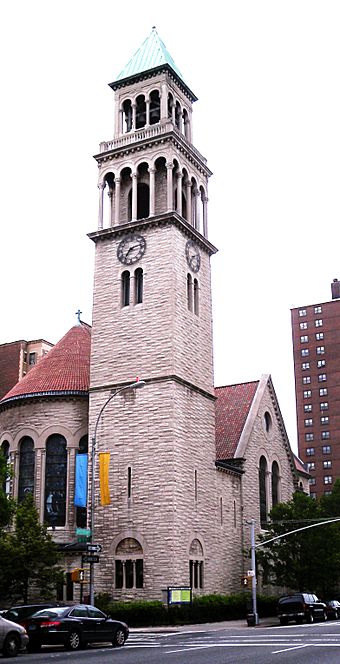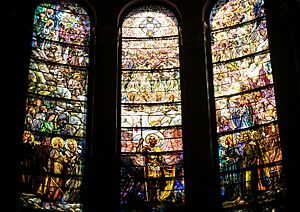St. Michael's Episcopal Church (Manhattan) facts for kids
|
St. Michael's Church
|
|

(2009)
|
|
| Location | 225 W. 99th St., New York, New York |
|---|---|
| Built | 1890–91 |
| Architect | Robert W. Gibson |
| Architectural style | Romanesque Revival, Renaissance Revival |
| NRHP reference No. | 96001354 |
Quick facts for kids Significant dates |
|
| Added to NRHP | November 15, 1996 |
St. Michael's Church is a very old Episcopal church in New York City. You can find it on the Upper West Side of Manhattan, at 225 West 99th Street and Amsterdam Avenue. The church started in January 1807. Back then, this area was a quiet countryside called the Bloomingdale District.
The building you see today is made of limestone. It was built between 1890 and 1891. This is the third church building on the same spot. Robert W. Gibson designed it in the Romanesque Revival style. In 1996, it was added to the National Register of Historic Places. This means it's a special building worth protecting.
St. Michael's Church is also famous for its beautiful Tiffany stained glass windows. It has two large pipe organs built in 1967. The church is known for its great sound quality, which is perfect for music. Besides regular church services, St. Michael's also has prayer groups.
The church sold its "air rights" to help pay for a big restoration project. This allowed a tall building called The Ariel to be built nearby. On April 12, 2016, the church, its parish house, and the rectory were named landmarks by the New York City Landmarks Preservation Commission. This helps protect them even more.
Contents
History of St. Michael's Church
St. Michael's Church is special because it has been in the exact same spot for over 200 years. This is very rare for churches in upper Manhattan.
Early Beginnings (1807-1891)
The first church building was a simple white wooden structure with a bell tower. It was built for people from Trinity Church who had summer homes nearby. They wanted a closer place to worship. At that time, New York City was only at the very southern tip of Manhattan. One famous person who attended was Elizabeth Schuyler Hamilton, the wife of Alexander Hamilton.
A second, larger wooden church was used from 1854 to 1891. In the 1840s and 1850s, a minister named Rev. Thomas McClure Peters helped start a missionary church. This church was in a diverse community called Seneca Village. This village was later removed to create Central Park. In the 1850s, the minister's wife, Mrs. William Richmond, helped create a home for women needing help. The Peters family, including Rev. Peters' son and grandson, led the church for a total of 99 years.
The Current Building (1891-Present)
The third and current church building was finished in December 1891. It was designed to hold 1,500 people. Its style mixes Romanesque and Byzantine designs. The church stands on land that was once a cemetery. When building the church, they decided not to move the graves. Some people, like Rev. Mr. Richmond, the first minister, are still buried there. The last burial happened in 1872. The current church was built after an elevated train line was added on Columbus Avenue. This helped the area grow from a rural district into a busy city.
In 1895, Louis Comfort Tiffany was asked to design and install seven large lancet windows. These windows show St. Michael winning a victory in Heaven. He also designed a marble altar. About 25 years later, Tiffany's overall design was completed. This included a mosaic in the Chapel of the Angels. From the 1890s to the 1920s, church members donated many other beautiful stained glass windows.
In 1997, St. Michael's Church became a Designated Historical Building. It was added to both the National Register of Historic Places and the New York State Register of Historic Places. You can still see hints of the old St. Michael's Lane in the alleys behind buildings south of 91st Street.
Architecture and Art
The church was designed by architect Robert W. Gibson. It has a tall, square Romanesque bell tower that reaches 160 feet high.
Tiffany studios created many amazing artworks for the church. After the building was finished, seven windows were made. These windows show "St. Michael's Victory in Heaven." Louis Comfort Tiffany designed them. Artists like Clara W. Parrish and Edward P. Sperry helped create these beautiful windows. Two more Tiffany stained glass windows were later added in the Chapel of the Angels. There is also a large Tiffany mosaic behind the altar.
Other Tiffany designs in the main church include a white marble altar, altar rail, and pulpit. The dome of the apse (a curved part of the church) also has Tiffany decorations. All these wonderful Tiffany features were added between 1891 and 1920. The windows were carefully cleaned and fixed in 1990. After the windows were restored, the church's entire inside was painted. The colors used were inspired by the windows and mosaics.
Church Organ
A special Rudolf von Beckerath organ was put into the church in 1967. This organ helps create beautiful music during services.
Community Impact
For most of its history, St. Michael's has helped shape New York City. It has influenced both the physical look of the city and its communities.
Helping the Community Grow
St. Michael's helped start at least six other churches in New York. One of these was All Angels' Church, which was first located in Seneca Village. After the Civil War, St. Michael's offered space and money for many helpful programs. These included the free Bloomingdale Clinic, a nurse association, a day nursery for children, and a library.
In the 1980s, the number of people attending the church became very small. But by 1987, it grew to 300 members. This was largely thanks to the hard work of Rev. Frederick Hill. St. Michael's is known for its many different programs. It also welcomes people from all backgrounds and parts of New York City.
In 2013, the church had five choirs. More than 100 children were part of its Christian Formation Program. The church also had social programs to help people who were hungry or homeless. They also supported those who were sick, their caregivers, and people who were unemployed. Both the church and its parish house provide space for many church activities. They also host major non-profit community groups.
Since the early 1990s, St. Michael's has partnered with another St. Michael's church in Promosa, South Africa. More recently, it has also partnered with the Diocese of Madras in the Church of South India.
See also
 In Spanish: Iglesia Episcopal de San Miguel (Manhattan) para niños
In Spanish: Iglesia Episcopal de San Miguel (Manhattan) para niños
 | William L. Dawson |
 | W. E. B. Du Bois |
 | Harry Belafonte |





